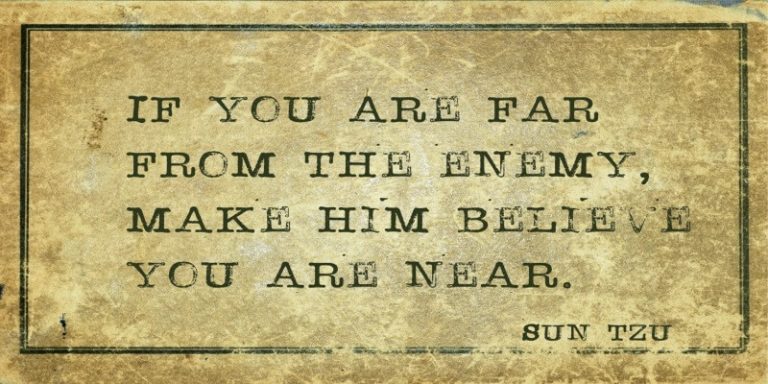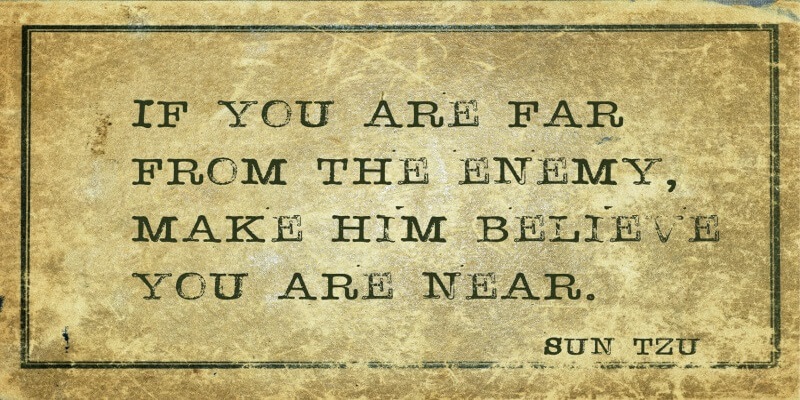
What can Sun Tzu's famous manuscript The Art of War teach screenwriters about the art, craft, and business of screenwriting?
Sun Tzu is known as the most significant war strategist who ever lived. His leadership and philosophy have influenced almost every great nation and military leader. But beyond that, his wise words have also inspired individuals in the corporate, business, and sports sectors.
Here we share some of Sun Tzu's best quotes from The Art of War and elaborate on how you can use his philosophies and strategies within the context of your screenwriting journey.
"Victorious warriors win first and then go to war, while defeated warriors go to war first and then seek to win."

It's all too common to see novice screenwriters (warriors) jump the gun and rush into the Hollywood game as they market their very first screenplays.
It's understandable. You've accomplished something grand — something that so many fail to do. You're excited by the prospect of sharing your script. Your head floats into the clouds as you fantasize about that big producer, executive, agent, manager, or star falling in love with your script and offering you six to seven figures to get it produced.
But you have to win at screenwriting first before you take your scripts to Hollywood.
The biggest mistake you can make is taking that first or second screenplay to industry insiders through networking or queries. When you've only written one or two screenplays, you're still learning. You're still honing your craft. You're still making multiple mistakes and hopefully learning from them.
Even if you luck out and that first or second script manages to place high in a contest or get you into some meetings, the first question you'll be asked after the small talk banter is, "What else do you have?"
It's not enough to have ideas for future projects, and it's not enough to have works-in-progress. You need to be able to reach into your figurative trunk of treasures and pull out three to five outstanding writing samples. Having a stack of strong scripts proves to them that you're not a one-hit wonder and that you can clearly deliver.
Victorious screenwriters win at screenwriting first and then go to war trying to get them read by Hollywood. Defeated screenwriters rush to Hollywood first before they've become great screenwriters worthy of a win.
"It is easy to love your friend, but sometimes the hardest lesson to learn is to love your enemy."
The enemy is not Hollywood, but the obstacles put forth against you as you strive to make this screenwriting dream come true.
Too many screenwriters become jaded and cynical towards the film and television industries. Visit any screenwriting social media thread or screenwriting article comment section, and you will see this truth in full form — screenwriters complaining about Hollywood's lack of originality and the exclusivity of the screenwriting trade while their own scripts are rejected by Hollywood endlessly.
"Look at all of the terrible movies that Hollywood makes, yet they can't take a chance on my script!?"
They make Hollywood — the very place they are trying to break into — the enemy. It's a pointless and unproductive venture.
The true enemy is the odds against you. And those odds are a direct result of oversaturation in the form of screenwriters and screenplays coming through each and every Hollywood door (studios, production companies, agencies, and management companies). So you have to battle that enemy endlessly to try to find a way in.
If you hate that process, you'll burn out very quickly. Instead, as Sun Tzu writes, you should learn to love your enemy. And in screenwriting context, you do that by embracing the process. Do your research to find out who the best companies and people are for your script. Do your best to network and find ways that you can get your script read by industry insiders.
Read ScreenCraft's Maps Screenwriters Can Use to Build Their Industry Network!
Consider the obstacles as a fun challenge with the additional excitement of seeking out positive results. Love your enemy, and you may just end up prevailing over them.
"There are roads which must not be followed, armies which must not be attacked, towns which must not be besieged, positions which must not be contested."
As a screenwriter, you have to choose the paths you take wisely.

Pursuing some unattainable dream of trying to sell that spec script sequel based on your favorite franchise is a road that you shouldn't follow. Sending blanket queries to the major agents that represent the most prominent stars is not the approach you want to take. Contacting the major studios busy making the biggest films in Hollywood will not be worth your efforts.
While some shots in the dark are perfectly fine to take, you have to form your plan of attack masterfully. You have to do the research and find production companies and industry insiders that are more accessible.
You do this by reading the trades (The Hollywood Reporter, Variety, and Deadline) and paying specific attention to companies and individuals making the latest screenwriting deals. You use IMdBPro to find films like yours, find who is making them, find who is writing them, and find who is representing those involved.
Planning a marketing strategy for your scripts is no different than a war plan. You pick and choose which battles are worth fighting and which should be avoided.
"He who knows when he can fight and when he cannot will be victorious."
When you get to the stage of writing for studios and production companies on assignment, your screenwriting process is going to have to adjust. In short, it's a whole different ballgame once you're being paid to write someone else's concept.
And even if you've defied the odds and have managed to option or sell your own script — and you've been contracted for that first rewrite — you're still going to have to prepare yourself for some eye-opening change in the process to come.
You'll now be getting notes from development executives, producers, directors, and maybe even marketing executives. You have to take all of those notes and apply them to your writing as you work on that next draft. And it's a guarantee that you'll find some that you just don't agree with.
Now, contrary to popular belief, Hollywood does want writers that stand up for what they believe in. But always remember that you have to choose your battles wisely. If you're proving yourself to be overly combative with each and every note, it's going to do you, them, and the script no good in the end.
You will slowly learn which battles are worth fighting, and especially which ones you can and cannot win.
"A kingdom that has once been destroyed can never come again into being; nor can the dead ever be brought back to life."
A kingdom can represent a contact you've made within the industry — or an opportunity you've been given to get your script read. It may be the result of networking, marketing, or winning a contest.
You have one chance to make a first impression, but once that chance has been exhausted by forwarding a work in progress script, sharing work before your writing skills have been honed (see the first quote), or reacting to feedback negatively, that kingdom that was once thriving in your mind will instantly be destroyed.

Once again, don't start marketing your scripts until they are ready and until you've honed your craft enough. Don't forward your first or second draft to anyone either. If it's not your ultimate, best effort final draft, you shouldn't be sharing it with any industry insiders. And finally, if they manage to give you feedback and it's not what you'd hope for, just thank them for the perspective, review it, take what you can from it, and then leave the rest behind. And do so with gratitude while avoiding trying to defend your writing.
"If you know the enemy and know yourself, you need not fear the result of a hundred battles."
Your screenwriting journey is not just about writing some compelling screenplays that you'll hopefully be able to sell or use as samples for coveted writing assignments. There's so much more to it than that.
You need the time to study the game and the players at hand. You need to understand your own strengths and weaknesses, and which you need to focus on to grow as a writer.
It's often said within the industry that behind every "overnight success" story is at least ten years of blood, sweat, tears, and seemingly endless failures and rejection.
Study the industry. Pay attention to the power players. Find ways in. Take a look in the mirror and begin to develop and understand who you are as a screenwriter. What makes you tick? Why should Hollywood take a chance on you?
If you take a step back and do these things for the first couple of years or more once you start your screenwriting journey, you'll be able to choose your battles wisely and navigate through that Hollywood battlefield with more ease.
"Do not repeat the tactics which have gained you one victory, but let your methods be regulated by the infinite variety of circumstances."
Complacency will kill your screenwriting career hopes.

Too many screenwriters attempt to rely on that one script that won the contest or placed high, rather than moving on to the next, and the next, and the next. They'll submit the same thing each year to the same contests and fellowships, hoping that they'll repeat the success they've had.
Others grow complacent by writing the same type of thing over and over — especially after a victory.
Yes, it is smart to present yourself as that writer that can handle this genre or the next so well, but you also have to challenge yourself by taking on different genres and subject matter throughout your screenwriting journey.
"Begin by seizing something which your opponent holds dear; then he will be amenable to your will."
In the context of this elaboration, your opponent is Hollywood.
And Hollywood loves certain things. Hollywood loves high concept scripts that can be sold on the logline and core concept alone. Hollywood loves scripts that can bring in a large audience with less risk (contained thrillers, horror, high concept comedy).
You do need to have those personal projects in your stack of samples that only you can write, yes. But you also need the types of scripts that Hollywood is most attracted to.
When you've seized a concept that they didn't know they wanted within the context of a genre or demographic they hold dear, they will be amenable to your will if the delivery is where it needs to be.
"Ponder and deliberate before you make a move."

So you've found that perfect industry insider. You've managed to get their contact information. Well done.
But before you pounce with a passionate email and plea for them to read and consider your script, stop and take some time to ponder and deliberate before you make your move.
Think about what you're going to write and how you're going to write it. This is your first impression. If you come off as overly confident, inexperienced, or overly aggressive, they may hit delete before even considering your concept.
Read ScreenCraft's Writing the Perfect Query Letter for Your Scripts!
"If you are far from the enemy, make [them] believe you are near."
This is the 21st century. You don't need to be in Los Angeles to write screenplays.
Make no mistake, it doesn't hurt to live there. In fact, it increases your odds of success tenfold. However, that's just not an option for some. Yet it's a sad fact that it remains to be a stigma to many within Hollywood — dealing with writers living outside of Los Angeles.
You always want to be transparent though. You never want to outright deceive. But that doesn't mean you can't make it seem like you are near to them.
When you familiarize yourself with the industry and understand the goings-on, that can translate into your email and Skype correspondence. Do your research and know what's going on in the industry. Read the industry bloggers and understand how deals are made, how scripts are developed, how movies are produced, and who the players are within that mix.
Read ScreenCraft's The Screenwriter’s Ultimate Guide to Hollywood Meeting Terminology!
Learn to talk to the talk and walk the walk. And by all means, be ready, willing, and able to travel to Los Angeles if they need you to.
Read ScreenCraft's Are You Truly Prepared for Success as a Screenwriter?!
These wise words from a brilliant strategist can help you prepare your battle plans and go to war in your screenwriting journey.
Ken Miyamoto has worked in the film industry for nearly two decades, most notably as a studio liaison for Sony Studios and then as a script reader and story analyst for Sony Pictures.
He has many studio meetings under his belt as a produced screenwriter, meeting with the likes of Sony, Dreamworks, Universal, Disney, Warner Brothers, as well as many production and management companies. He has had a previous development deal with Lionsgate, as well as multiple writing assignments, including the produced miniseries Blackout, starring Anne Heche, Sean Patrick Flanery, Billy Zane, James Brolin, Haylie Duff, Brian Bloom, Eric La Salle, and Bruce Boxleitner. Follow Ken on Twitter @KenMovies
For all the latest ScreenCraft news and updates, follow us on Twitter, Facebook, and Instagram.
Tags
Get Our Screenwriting Newsletter!
Get weekly writing inspiration delivered to your inbox - including industry news, popular articles, and more!



























